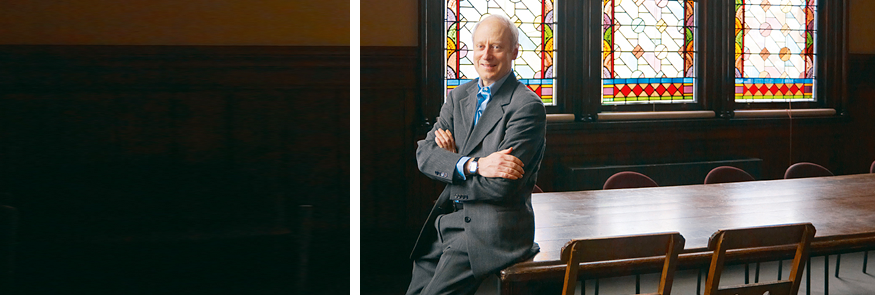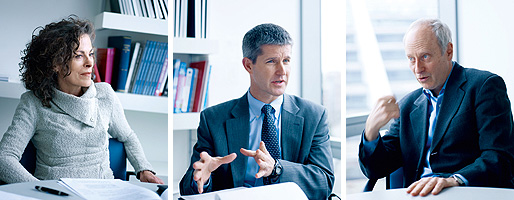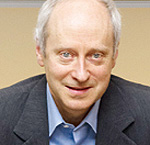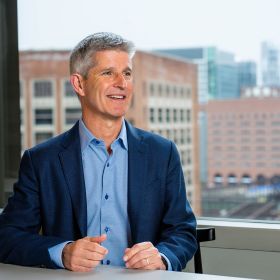Interview with political philosopher Michael J. Sandel
“Choice Flows from how I interpret my identity, and part of my identity is that I am the son of my parents.”

1
Political philosopher Michael J. Sandel talks to THE FOCUS about community and family, parents and children – and why The Godfather is his favorite movie. Any philosophy that sees the individual primarily as a member of various communities will have plenty of positive things to say about the family. The family is a school for responsibility and civic virtues, the nucleus of the state, and a corrective to the individualism of the free market. Last, but not least, it is also a school for humility.
The Focus: You are seen as a “communitarian” but you don’t feel too comfortable with the label. Could you tell us why?
Michael Sandel: Well, let me begin by describing how that label does fit. I have argued against what I see as the excessive individualism of market-driven societies. And I have argued that a good society requires a stronger sense of community and of mutual responsibility than we often find in such societies. So I have argued for a greater emphasis on citizenship, civic virtues and the common good. In that sense, it would be fair to call me a “communitarian”. However, the term “communitarian” sometimes refers to the idea that we are all obligated to adhere, uncritically, to whatever values the majority favors. I reject this idea. In many times and places, community has been invoked to defend uncritical conformity to hierarchy and tradition. Community, understood in this way, can be suffocating. I don’t want to be seen or interpreted as a defender of the oppressive aspects of community. My work attempts to articulate a corrective to the excesses of American-style individualism, and that corrective has to do with a greater emphasis on the moral ties of family and community.
The Focus: Are we to understand community as a place where the important questions are already settled and resolved?
Sandel: No, by no means. One of the central questions of political philosophy is to figure out how to live together when we disagree about values, about morality, and about what the “common good” consists in. And there is no society in the world where this question doesn’t arise.
Some political philosophers say that because we don’t agree about big moral questions, the way to organize society is to try to come up with laws and policies that are neutral with respect to morality. In my book Justice: What’s the Right Thing to Do?, I challenge this idea. I don’t think it is possible or even desirable to try to be neutral towards the competing moral convictions that citizens bring to public life. I think instead that the way to contend with the pluralism of modern societies is to welcome all moral convictions and to engage with them in public dialogue.
“To reason in public about big questions is a civic skill that needs to be nurtured and cultivated.”
The Focus: But doesn’t that require a highly-developed culture of dialogue?
Sandel: Yes, and creating a culture of civil dialogue isn’t easy. We need to learn the art of democratic discourse. It doesn’t just happen; it is an educational project. What we need is a kind of civic education that includes not only knowledge and interest in public affairs but also the ability to engage in reasoned argument and debate about public questions and the common good.
The political parties have by and large failed at this, and the media now encourage the lowest form of shouting matches rather than reasoned deliberation about the common good. Our schools and universities need to see it as part of their mission to educate young people to be active, critically-minded citizens capable of engaging in public discourse about morally contentious questions. And the family is another institution that can shape and cultivate the ability of all of us to develop these civic capacities.
The Focus: So in your view, the community is a framework for debate. But how should a community deal with an individual who feels fenced in and wishes to break out and do something completely different?
Sandel: I’d say that what you are describing is similar to what happens in a family quarrel. There can be conflicts across and among cultures and civilizations, but the deepest conflicts and disagreements are often within cultures and traditions, or even families. Those are disa- greements about how best to interpret shared histories, experiences, and life stories.
Think of a more mundane example. If you are engrossed in a novel or in a movie that is rich and compelling, you might have a disagreement with someone who is equally engrossed about what should happen next. You may even come to the end of the novel or the movie and say, “That is a terrible ending! Really, if they had understood what this story is about, they would have had a different ending!” And you could have a reasoned argument about that with someone. But it would be an argument within and about a shared narrative. The disagreement would be about how best to make sense of the story. You couldn’t have that argument with someone who lacked familiarity with the characters, who didn’t in some way identify with them, or who wasn’t absorbed by the story.
The Focus: So despite that shared experience, we defend our position because we have chosen what we think is right for us. Isn’t that closer to a more liberal position than you are suggesting?
Sandel: No, because our disagreement involves a clash of competing interpretations, not choices. The disagreement is not about what I want or prefer but about what is the best interpretation of this character, this story, this narrative. If it were just a matter of personal choice, then you could use the image of a smörgåsbord, where you choose what you like and I choose what I like – and there’s nothing to argue about. But when we argue about what a particular character in the novel or in the movie should have done or would have done, we are really arguing about what is the best interpretation – of the person and the story, taken as a whole.
The Focus: How does that help in deciding what to do? Take, for example, somebody inheriting a family business: does he or she have to accept the inheritance? Is he or she bound to continue the business in the time- honored tradition?
Sandel: Not necessarily. The person faced with the decision clearly has a choice to make. The interesting question is how one’s past, and one’s sense of obligation to parents and family, should bear on that decision. Such major life choices often require us to wrestle with competing aspects of our identity – our identity as the child of our parents as against our identity as having a certain calling that cannot be fulfilled if we take over running the business. Suppose, for example, that a child really has a gift as a musician: that calling is an important part of his or her identity. But so is his or her identity as a son or daughter, or the grandchild of this long family tradition. That involves a clash about what is the fullest realization of any individual’s identity.
One of my favorite movies is a story about a family – The Godfather. In many ways, it is a story about the American immigrant experience, but it is also a story about the pressure that family and tradition exert on identity. There’s a scene where Michael Corleone tells his fiancée that he wants to break free of the family business. But then circumstances conspire to draw him back. What makes this a fascinating story is that it says something deep about this human experience. You see Michael Corleone struggle to break free, and in the end he doesn’t, and that in a way is his tragedy. I find that a poignant tale.
“Michael Corleone struggles to break free, and in the end he doesn’t, and that in a way is his tragedy.”
The Focus: What is it that enables families to resolve their conflicts despite deep divisions? Many companies would love to create that kind of cohesion in their workforce. Is it about creating a shared context?
Sandel: The most successful global companies that I have observed go beyond a shared context and manage over time to develop a culture. I think that what is re- quired is finding a way to translate a context into a shared culture. The term “culture” is borrowed from the world of anthropology and sociology, and we often think of cultures as histories of countries and peoples. But the shaping and creation of cultures is also an educational project. What distinguishes a context from a culture is the presence of some shared values, and those values have to be cultivated and developed. And this takes us back to the idea of education; developing a culture requires civic education – shared values don’t just bubble up.
The Focus: When you talk about education, it has a ring of rational planning to it. But many families experience life as a sequence of twists and turns. In your book The Case against Perfection, you yourself called parenthood “a school for humility.”
Sandel: Yes. That book grew out of a worry that bears directly on the question of families and new technology. I served for four years on the President’s council on Bioethics at a time when we were discussing new genetic technologies that would enable parents for example to choose the sex of their children, or to improve their height or their physical strength and ultimately to influence their children’s intelligence or athletic prowess or musical ability. I think what is wrong with the aspiration to use biotechnology to create stronger, smarter, more handsome children is that it risks turning parenthood into an extension of the consumer society. It risks turning children into commodities. This is at odds with the ideal of unconditional love of parents for children. In the wider context of human life it is important that parenthood should consist of surprises, of the unpredictable.
The Focus: You can hardly blame parents for wanting to do the best for their children.
Sandel: Yes, we want to do the best for our children, but it’s an important fact about parenthood that we can’t control how our children turn out. Did you ever see the movie Gattaca? It plays out a science fiction scenario of parents routinely choosing their children’s genetic characteristics. Parents go to a genetics counselor to pick and choose the hair color, eye color, height, and skills of their children-to-be. Later on in the movie, there is a brilliant piano concerto being played, and you see that the pianist has six fingers on each hand, not five. You can imagine the parents saying “I want my child to be the world’s greatest pianist.” But what if that child really wanted to be a baseball player, and it is very hard to do that with an additional finger? Parenthood is, and should remain, a moral education in humility.
The Focus: What moral obligations do you see in families? And how do we find the right balance?
Sandel: Well, it is interesting that the question of obligations in families has now been reversed in many ways, focusing on the parents’ obligations towards their children. There is relatively little attention paid to the question of children’s obligations to their parents. I think that is connected to the individualism that we were speaking about earlier.
If we think of obligation as flowing only from consent or choice or contract, then it is actually very difficult to make any sense of an obligation that the child would have to the parent, because there you do have an asymmetry: parents choose to have a child but not the other way around. That idea explains the asymmetry of obligation that we observe in Western societies. And yet there may be something troubling about that idea and that practice.
The Focus: Which is not one that you favor?
Sandel: No. I have argued instead that certain obligations may flow from a sense of belonging to a family or community that can’t fully be captured by the language of consent or contract or choice. If there are obligations of membership, then children do have obligations to their parents. And the way to try to work them out is to work out the story, the tradition, the terms of membership that have evolved within that family over time.
The consent-based, contract-based idea begins with choice, asking “What do I want?” The idea of obligation based on membership or belonging produces a choice: “Should I turn this way rather than that?” But that choice flows from how I interpret my identity, and part of my identity is that I am the son or the daughter of my parents. This is where tradition comes in, and memory.
The Focus: In your book Justice: What’s the Right Thing to Do?, you discuss memory and moral responsibility. How far back should memory reach?
Sandel: The hard question is “Do I have a special responsibility to right the wrongs that a previous generation may have carried out, my parents’ or my grandparents’ generation?” This raises the question of collective responsibility across time. I believe we do have such obligations.
In Germany, there have been very serious and sustained discussions about the moral weight of memory and about responsibility reaching across generations. That debate would make no sense unless you believed that obligations can arise from our history and collective identities as well as our individual choices.
To go back to your earlier question, I didn’t quite tell you how the child faced with the dilemma of taking over the family business or following his or her own ambitions should decide. There is no formula. But there are more or less morally responsible ways of addressing history and of facing up to its consequences for the present.

The interview with Michael Sandel in Boston was conducted by Greig Schneider, Egon Zehnder, Boston, and Ulrike Krause, THE FOCUS.
RESUMÉ Michael J. Sandel

Michael J. Sandel was born in Minneapolis in 1953. He studied at Brandeis University near Boston and received his doctorate in 1981 from Oxford, where he was Rhodes Scholar. His early writings helped launch the “communitarian” movement, although Sandel prefers to see himself as an exponent of “public philosophy”, which seeks to strengthen moral and civic engagement in the public sphere.
Sandel, who has taught political philosophy at Harvard since 1980, himself operates very much in the public sphere. His recent book Justice: What’s the Right Thing to Do? has been translated into fifteen languages and sold over 1.5 million copies. His lectures on justice, which attract up to 1,000 students each time they are offered, have become the first Harvard course to be made freely available online (www.JusticeHarvard.org) and on television around the world. Michael Sandel regularly gives guest lectures and talks, including the prestigious Reith Lectures on BBC Radio 4 in 2009. In 2010, China Newsweek named Sandel the “most influential foreign figure of the year” in China. He is married with two grown-up sons.
PHOTOS: JÜRGEN FRANK





